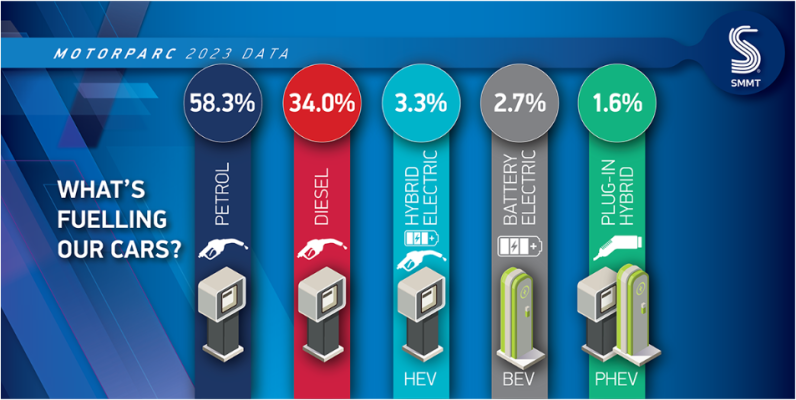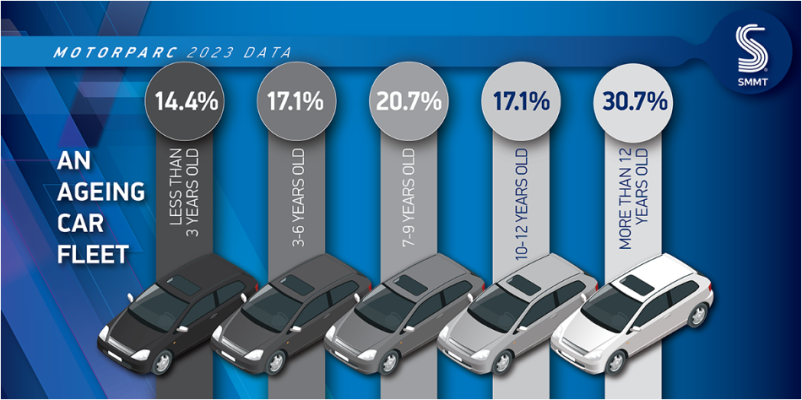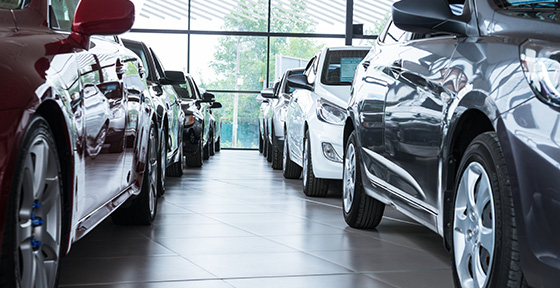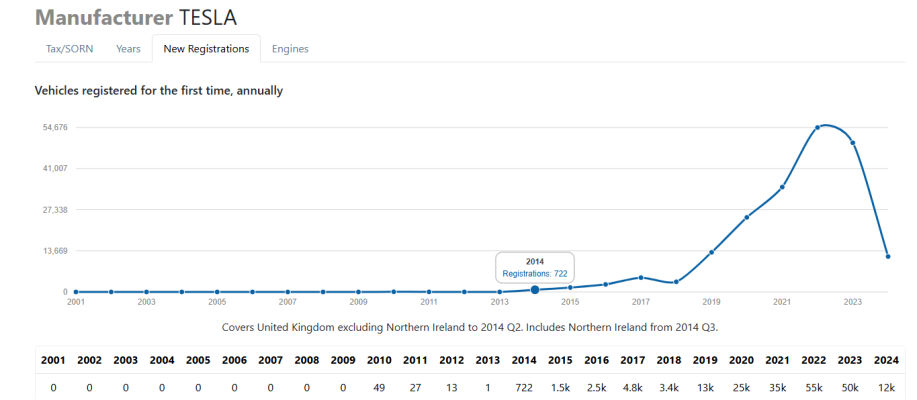After a bit more Googling it seems the car (gen 2, anyway) does make an ICE sound at low speeds:
Navigation
Install the app
How to install the app on iOS
Follow along with the video below to see how to install our site as a web app on your home screen.
Note: This feature may not be available in some browsers.
More options
You are using an out of date browser. It may not display this or other websites correctly.
You should upgrade or use an alternative browser.
You should upgrade or use an alternative browser.
The EV fact thread
- Thread starter Petrol Pete
- Start date
I've been away for a lot of August and am just catching up with recent news etc. Interesting video from Harry's Garage - worth a look IMHO.
Lots of stuff in there ... there's a reference to 'Motorparc' which is the SMMT's annual report on all cars on the road in the UK (as opposed to the new car sales/registration data that gets mentioned more often).

 www.smmt.co.uk
www.smmt.co.uk
As at the end of 2023 only 2.7% of cars on the road in the UK were BEVs:

The average age of cars in use is going up ... with close to 50% being over 10 years old now:

Lots of stuff in there ... there's a reference to 'Motorparc' which is the SMMT's annual report on all cars on the road in the UK (as opposed to the new car sales/registration data that gets mentioned more often).

Motorparc Vehicles in Use (UK)
SMMT is the country’s primary source of data on the motor industry. Click here for the SMMT motorparc vehicles in use
As at the end of 2023 only 2.7% of cars on the road in the UK were BEVs:

The average age of cars in use is going up ... with close to 50% being over 10 years old now:

I hadn't spotted that the US had imposed huge EV import tariffs a few months back. Canada has now followed suit:
100% seems bonkers - of course the EU tariff for Tesla ended up as 'just' 9% ... I wonder if something similar will happen in North America?
OTTAWA, Aug 26 (Reuters) - Canada, following the lead of the United States and European Union, said on Monday it would impose a 100% tariff on imports of Chinese electric vehicles and announced a 25% tariff on imported steel and aluminum from China.
The duties apply to all EVs shipped from China, which would include those made by Tesla, a Canadian government official said.
Shares of the most valuable global automaker closed down 3.2%.
100% seems bonkers - of course the EU tariff for Tesla ended up as 'just' 9% ... I wonder if something similar will happen in North America?
Dryce
Hardcore MB Enthusiast
- Joined
- May 17, 2006
- Messages
- 11,680
- Car
- GLE
The average age of cars in use is going up ... with close to 50% being over 10 years old now:
Problem is that with the cost of cars going up - combined with uncertainty of political intervention in the market - it makes more sense than ever to keep an older car going.
- Joined
- Jun 24, 2008
- Messages
- 49,757
- Location
- London
- Car
- 2022 Hyundai IONIQ 5 RWD / 2016 Suzuki Vitara AWD
...As at the end of 2023 only 2.7% of cars on the road in the UK were BEVs:...
I didn't realise it was that much. That's quite impressive, given that EVs have only been selling in earnest in the UK for under 5 years, while the other type of cars have been selling for far far longer.
It would be interesting to see what percentage of the 'less than 3 years old' cars are EVs? My guess would be 15%-20%?
Dryce
Hardcore MB Enthusiast
- Joined
- May 17, 2006
- Messages
- 11,680
- Car
- GLE
I didn't realise it was that much. That's quite impressive, given that EVs have only been selling in earnest in the UK for under 5 years, while the other type of cars have been selling for far far longer.
It would be interesting to see what percentage of the 'less than 3 years old' cars are EVs? My guess would be 15%-20%?
These numbers are not impressive.
They are below the basic levels required to meet government targets. That implies failure. Worse that is with government incentives to support new sales of these vehicles. That screams failure.
I didn't realise it was that much. That's quite impressive, given that EVs have only been selling in earnest in the UK for under 5 years, while the other type of cars have been selling for far far longer.
It would be interesting to see what percentage of the 'less than 3 years old' cars are EVs? My guess would be 15%-20%?
Tesla Model S has been on sale in the UK for 10 years I think.
2024 BEV market share for new car registrations (to end of July) is 16.8%. Hybrids 22%, petrol 54.7%.

Car Registrations
SMMT is the country’s primary source of data on the motor industry. Click here for the SMMT car registrations data published monthly
Figures for vans are *much* worse with a 2024 YTD BEV market share of only 4.8% vs 92.3% for diesel.

LCV Registrations
SMMT is the country’s primary source of data on the motor industry. Click here for the SMMT Van and Truck registrations data
Worse that is with government incentives to support new sales of these vehicles.
And the withdrawal of popular ICE models, and heavy promotion/marketing, and price cutting, and investment in infrastructure (charging stations etc.).
- Joined
- Jun 24, 2008
- Messages
- 49,757
- Location
- London
- Car
- 2022 Hyundai IONIQ 5 RWD / 2016 Suzuki Vitara AWD
Tesla Model S has been on sale in the UK for 10 years I think.
True, plus some other types of electric vehicles, but I think we can safely assume that the numbers sold in the UK were miniscule until around 5 years ago.
...2024 BEV market share for new car registrations (to end of July) is 16.8%....
That makes sense, and I expect that this will be (roughly) the overall percentage of EVs out of the 'less than 3 years old' group.
- Joined
- Jun 24, 2008
- Messages
- 49,757
- Location
- London
- Car
- 2022 Hyundai IONIQ 5 RWD / 2016 Suzuki Vitara AWD
These numbers are not impressive.
This depends on your expectations.
They are below the basic levels required to meet government targets. That implies failure. Worse that is with government incentives to support new sales of these vehicles. That screams failure.
Or perhaps that iimplies failure of the government when estimating the results of their actions and setting targets accordingly?
Other countries with more targeted incentives faired much better than the UK.
True, plus some other types of electric vehicles, but I think we can safely assume that the numbers sold in the UK were miniscule until around 5 years ago.
Agreed, but they were readily available then so the low sales are arguably still relevant when considering market share over the years. Tesla's sales in the UK didn't really take off until the Model 3 was launched (which was indeed 5 years ago):

(Obviously the 2024 data is incomplete).
That makes sense, and I expect that this will be (roughly) the overall percentage of EVs out of the 'less than 3 years old' group.
Could be, but I suspect more BEVs are being sold now (for the reasons mentioned above - recent price cutting, withdrawal of ICE models, etc.) than in the previous couple of years.
The small overall percentage of BEVs on the road might explain the empty fast charging sites that drivers mention (with many private owners only ever charging at home of course).
TrueSpirit
Active Member
- Joined
- May 6, 2021
- Messages
- 711
- Location
- surrey
- Car
- W212 6.2l.e63, E93 M3, prev w212 e63s, w211 e63, s205 C63s, GLA45,.E46M3, E64645c1, 330ci etc
It is difficult to deny (no matter what the excuse is) that EV sales proportions are below the government mandated targets.These numbers are not impressive.
They are below the basic levels required to meet government targets. That implies failure. Worse that is with government incentives to support new sales of these vehicles. That screams failure.
- Joined
- Sep 27, 2016
- Messages
- 13,420
- Location
- UK
- Car
- Tesla Model S, Model 3 LR, Model X /// Previous: Jaguar XFR, Mercedes E320 CDI, C32 AMG, CLK 320
The Model S was a 6 figure car new - hardly a surprise it didn’t sell in massive volume when it was first released, not that Tesla could have even met demand like that when they first began production.Agreed, but they were readily available then so the low sales are arguably still relevant when considering market share over the years. Tesla's sales in the UK didn't really take off until the Model 3 was launched (which was indeed 5 years ago):
I’ve been generally avoiding this thread over the last few months - doesn’t seem that too much has changed! 

People just seem so polarised on opinion, almost delighting in facts and figures to support a desire to see EVs not be a success?
And as arguments against gradually fade - be it that of initial cost, availability of chargers or whatever it seems as though the goalposts of the argument are moved.
I still don’t own or drive an EV, but I don’t have an issue with them either. What’s the problem?
Haven’t seen any hydrogen filling stations recently or hydrogen cars driving about, how are they doing btw?
Perhaps there should be a monthly round up by someone on here to avoid having to read through all 271 pages and almost 5.5k posts
People just seem so polarised on opinion, almost delighting in facts and figures to support a desire to see EVs not be a success?
And as arguments against gradually fade - be it that of initial cost, availability of chargers or whatever it seems as though the goalposts of the argument are moved.
I still don’t own or drive an EV, but I don’t have an issue with them either. What’s the problem?
Haven’t seen any hydrogen filling stations recently or hydrogen cars driving about, how are they doing btw?
Perhaps there should be a monthly round up by someone on here to avoid having to read through all 271 pages and almost 5.5k posts
- Joined
- Jan 21, 2005
- Messages
- 30,313
- Location
- Mittel England
- Car
- Smart ForFour AMG Black Series Night Edition Premium Plus 125 Powered by Brabus
The previous Government slowed things down themselves by putting back the date from 2030 to 2035. It was highly likely to happen, but would have been better played much closer to the deadline. Instead they went for a crowd pleaser ahead of a general election, same with HS2.These numbers are not impressive.
They are below the basic levels required to meet government targets. That implies failure. Worse that is with government incentives to support new sales of these vehicles. That screams failure.
I know several people who were ready to make the switch to EV on their next (private) car change - in case a new ICE would be worth peanuts on the subsequent change - but have decided that won’t be the case until five years further down the trac since the date was pushed back.
- Joined
- Jun 24, 2008
- Messages
- 49,757
- Location
- London
- Car
- 2022 Hyundai IONIQ 5 RWD / 2016 Suzuki Vitara AWD
...The small overall percentage of BEVs on the road might explain the empty fast charging sites that drivers mention (with many private owners only ever charging at home of course).
I suspect it has more to do with the extortionate cost of electricity from fast motorway chargers (nearly double what I paid in France and Switzerland).
My guess is that people avoid them like the plague and only use them when absolutely necessary - prioritising charging at home, at work, or for free in (some) retail car parks over motorway services.
- Joined
- Jun 24, 2008
- Messages
- 49,757
- Location
- London
- Car
- 2022 Hyundai IONIQ 5 RWD / 2016 Suzuki Vitara AWD
I’ve been generally avoiding this thread over the last few months - doesn’t seem that too much has changed!
People just seem so polarised on opinion, almost delighting in facts and figures to support a desire to see EVs not be a success?
And as arguments against gradually fade - be it that of initial cost, availability of chargers or whatever it seems as though the goalposts of the argument are moved.
I still don’t own or drive an EV, but I don’t have an issue with them either. What’s the problem?
Haven’t seen any hydrogen filling stations recently or hydrogen cars driving about, how are they doing btw?
Perhaps there should be a monthly round up by someone on here to avoid having to read through all 271 pages and almost 5.5k posts
The key question is whether people who are pro-EV go out and buy (or lease) them, or perhaps it's the other way around, and people who actually have EVs realise that the scaremongering is mostly fictional.
- Joined
- Jan 21, 2005
- Messages
- 30,313
- Location
- Mittel England
- Car
- Smart ForFour AMG Black Series Night Edition Premium Plus 125 Powered by Brabus
I did see a Hydrogen car this year, a Toyota. It was the car that Toyota takes to shows. The guy from Toyota who was with the car (not an official spokesperson) said that it’s not really practical or viable for passenger cars and is more of a technical exercise for Toyota.Haven’t seen any hydrogen filling stations recently or hydrogen cars driving about, how are they doing btw?
He said that their investment in hydrogen is for other applications - like trucks, buses, heavy plant, machinery and even marine - building hydrogen cars helps them to hedge bets in the automotive sector and create something relevant to most people for marketing purposes.
Interesting insight.
- Joined
- Jan 21, 2005
- Messages
- 30,313
- Location
- Mittel England
- Car
- Smart ForFour AMG Black Series Night Edition Premium Plus 125 Powered by Brabus
To be fair most people only buy petrol or diesel from a motorway service station when they have no alternative, it’s a distress purchase, because it too is very expensive.IMy guess is that people avoid them like the plague and only use them when absolutely necessary - prioritising charging at home, at work, or for free in (some) retail car parks over motorway services.
- Joined
- Jun 24, 2008
- Messages
- 49,757
- Location
- London
- Car
- 2022 Hyundai IONIQ 5 RWD / 2016 Suzuki Vitara AWD
To be fair most people only buy petrol or diesel from a motorway service station when they have no alternative, it’s a distress purchase, because it too is very expensive.
And then consider the fact that electricity from motorway services can be (nearly) tenfold more expensive than home charging.... not just the 10% or so difference in the cost of fuel.
Similar threads
- Replies
- 26
- Views
- 3K
- Replies
- 263
- Views
- 16K
